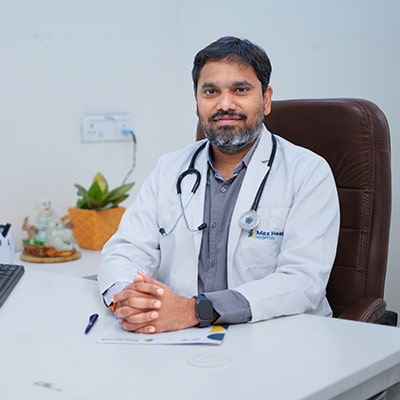-
 Mail us
Mail usinfo@myhealthhospitals.com
-
 Toll Free
Toll Free+91 9111674111
- Book Appointment
Doctor
Are you searching for the best gastroenterologist in Kukatpally? Dr. Krishna Chaitanya Vattem at My Health Hospital is a renowned expert in digestive health and gastrointestinal treatments. With extensive experience and over 500 successful gastrointestinal surgeries, Dr. Krishna Chaitanya Vattem specializes in diagnosing and treating conditions like acid reflux, IBS, liver diseases, and pancreatitis. His patient-centric approach, combined with advanced diagnostic tools, ensures effective care tailored to your needs. Visit My Health Hospital for comprehensive gastroenterology care in Kukatpally today!

Dr. Krishna Chaitanya Vattem says "I am a general surgeon with an expertise in laparoscopy. I have been trained in hepatobiliary surgery and advanced laparoscopic surgeries including but not limited to, anti-reflux surgeries, bariatric surgery and colorectal procedures. however my core interest lies in hepatobiliary surgery.
I see that my patients gets best quality of treatment, and put my best efforts to walk him home healthy at the earliest."
Patient Consultation and Evaluation: Gastrointestinal and laparoscopic surgeons are responsible for meeting with patients, conducting thorough medical histories, and performing physical examinations to assess gastrointestinal issues and determine if surgical intervention is necessary.
Diagnostic Procedures: They may order and interpret diagnostic tests such as endoscopies, colonoscopies, and imaging studies to diagnose gastrointestinal conditions accurately.
Surgical Planning: Gastrointestinal surgeons plan and discuss surgical procedures with patients, considering the best approach for each case, whether traditional open surgery or minimally invasive laparoscopic techniques.
Laparoscopic Surgery: Performing laparoscopic surgeries using specialized instruments and a camera to minimize incisions and reduce recovery time for patients.
Gastrointestinal Surgeries: Conducting a variety of gastrointestinal surgeries, including but not limited to appendectomies, hernia repairs, colorectal surgeries, and gastric procedures.
Preoperative and Postoperative Care: Providing comprehensive care before and after surgery, including patient education, managing preoperative preparations, and overseeing postoperative recovery and follow-up care.
Collaboration with Multidisciplinary Teams: Coordinating with other healthcare professionals such as gastroenterologists, radiologists, oncologists, and nurses to ensure holistic patient care and treatment plans.
Research and Continuing Education: Staying updated on the latest advancements in gastrointestinal surgery, laparoscopic techniques, and medical research. Contributing to or conducting research studies to improve surgical outcomes.
Emergency Response: Being prepared to respond to emergency situations, such as perforations or complications during surgery, and making quick decisions to address unforeseen challenges.
Patient Advocacy: Advocating for the well-being of patients, ensuring that they are informed about their condition, treatment options, and actively involved in the decision-making process. Additionally, supporting patients through the emotional and psychological aspects of surgery.